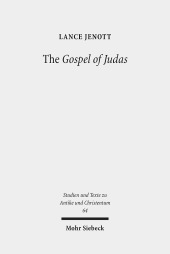 Neuerscheinungen 2011Stand: 2020-01-07 |
Schnellsuche
ISBN/Stichwort/Autor
|
Herderstraße 10
10625 Berlin
Tel.: 030 315 714 16
Fax 030 315 714 14
info@buchspektrum.de |

Lance J. Jenott
The Gospel of Judas
Coptic Text, Translation, and Historical Interpretation of ´the Betrayer´s Gospel´
2011. X, 256 S. 23,5 cm
Verlag/Jahr: MOHR SIEBECK 2011
ISBN: 3-16-150978-1 (3161509781)
Neue ISBN: 978-3-16-150978-0 (9783161509780)
Preis und Lieferzeit: Bitte klicken
Lance Jenott presents a new critical edition, annotated translation, and interpretation of the Gospel of Judas which, for the first time, includes all extant fragments of the manuscript. Departing from the scholarly debate over how this second-century Gospel portrays the character of Judas Iscariot, he investigates the text´s preoccupation with Jesus Twelve Disciples, and why its author slanders them as immoral priests who unwittingly offer sacrifice to a false god. Jenott challenges previous interpretations of Judas as a Gnostic text that criticizes the sacrificial theology, Christology, and ritual practices of the orthodox church, including Eucharist and baptism. Instead, he emphasizes how its Christian author voices a political critique of the emerging clergy who established their ecclesiological authority through doctrines of apostolic succession and the exclusive right to administer the Eucharist. Lance Jenott presents a new critical edition, annotated translation, and interpretation of the Gospel of Judas which, for the first time, includes all extant fragments of the manuscript. Departing from the scholarly debate over how this second-century Gospel portrays the character of Judas Iscariot, he investigates the text´s preoccupation with Jesus´ Twelve Disciples, and why its author slanders them as immoral priests who unwittingly offer sacrifice to a false god. Jenott challenges previous interpretations of Judas as a Gnostic text that criticizes the sacrificial theology, Christology, and ritual practices of the orthodox church, including Eucharist and baptism. Instead, he emphasizes how its Christian author voices a political critique of the emerging clergy who established their ecclesiological authority through doctrines of apostolic succession and the exclusive right to administer the Eucharist.


